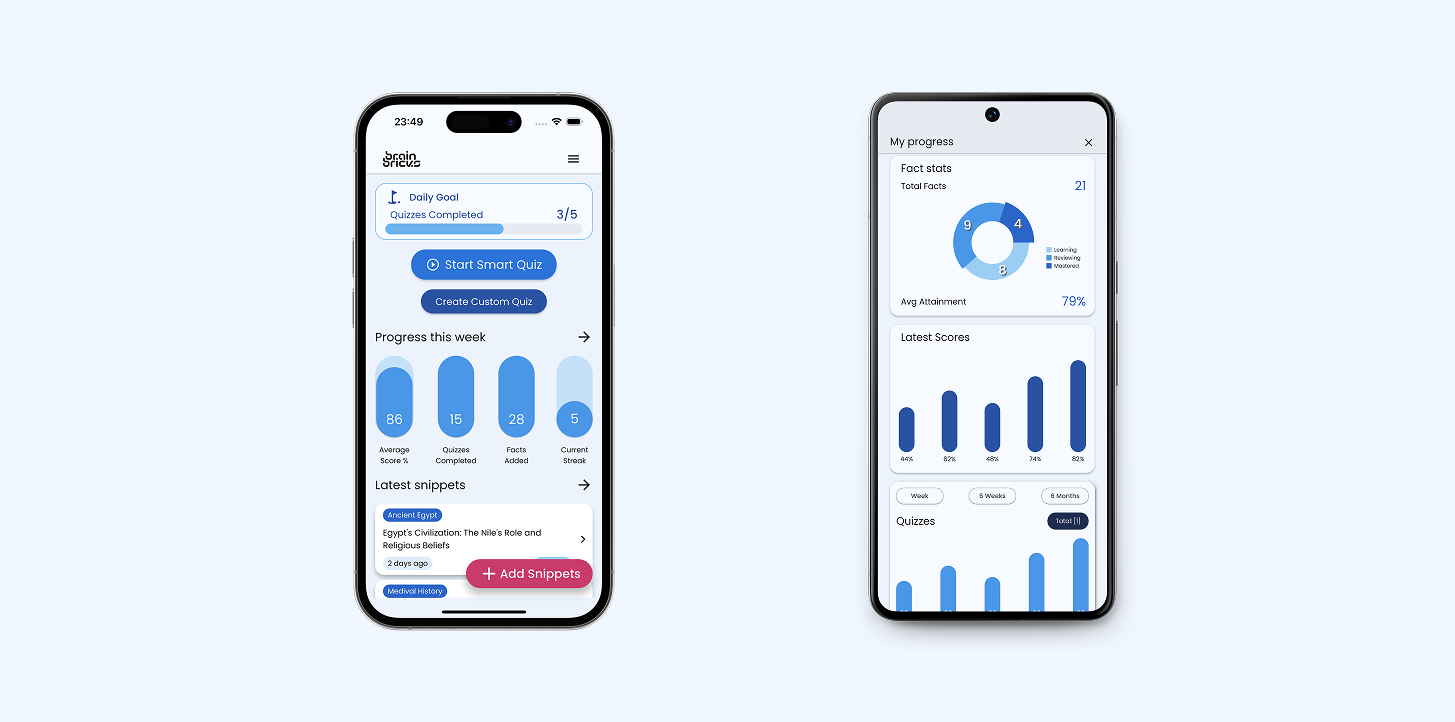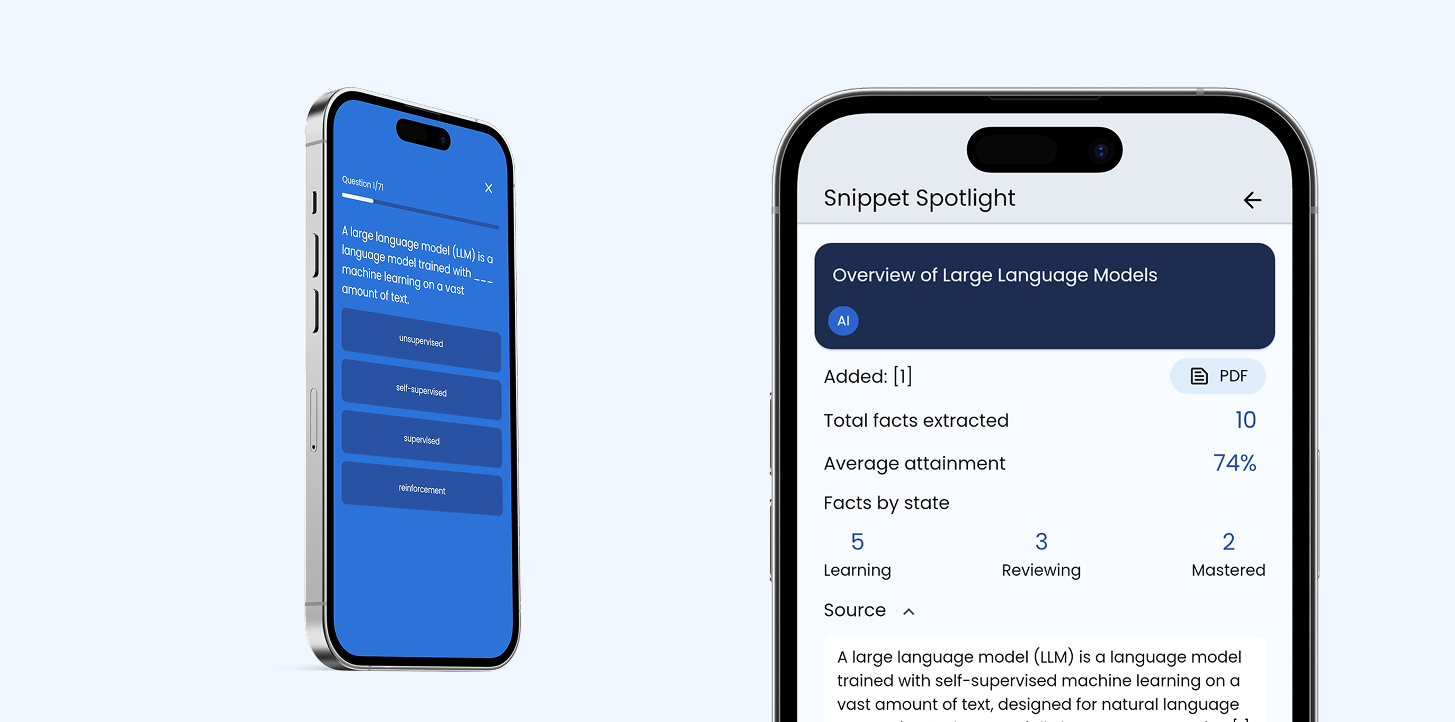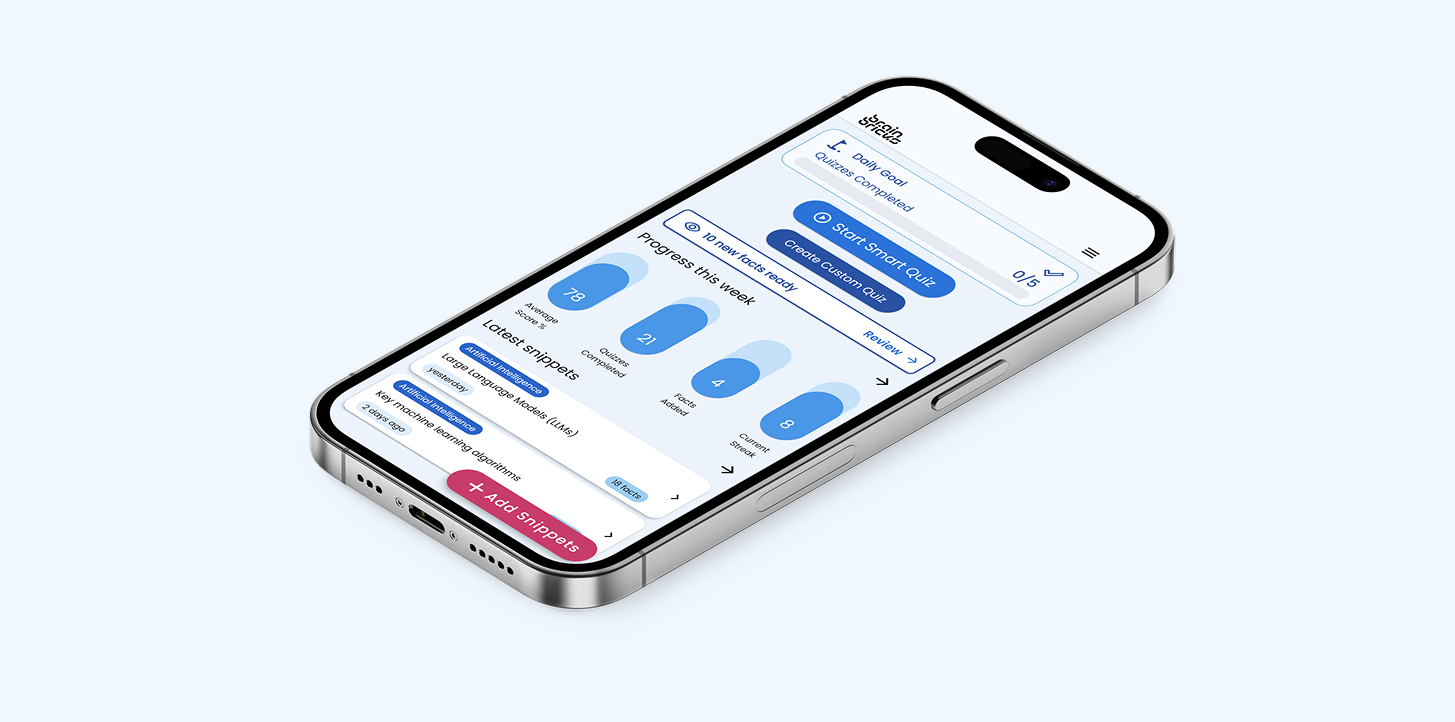Beyond Studying: How Professionals Use Spaced Repetition for Career Success

Beyond Studying: How Professionals Use Spaced Repetition for Career Success
You've mastered calculus, memorized historical dates, and aced your final exams. But then you enter the workforce and discover a harsh reality: professional success depends on continuous learning, and cramming doesn't work in the real world.
While spaced repetition and active recall are transforming how students learn, forward-thinking professionals are discovering these same techniques can accelerate career growth, improve job performance, and create sustainable competitive advantages in rapidly evolving industries.
The Professional Learning Challenge
The corporate world presents unique learning challenges that traditional study methods can't address:
Information Overload: New employees face floods of company policies, product specifications, industry terminology, and process documentation—far more than any cramming session can handle.
Just-in-Time Requirements: You need to recall specific details during client meetings, presentations, and high-stakes conversations—often months after learning them.
Continuous Updates: Products evolve, regulations change, and best practices shift. Your knowledge base must adapt continuously, not just during designated "study periods."
Performance Pressure: Unlike academic settings where you might retake an exam, professional knowledge gaps have immediate consequences: lost deals, missed opportunities, and damaged credibility.
Limited Study Time: Most professionals can't dedicate hours to traditional study methods. Learning must integrate seamlessly into busy schedules.
Strategic Application #1: Interview Preparation That Actually Works
Traditional interview prep involves memorizing scripted answers and hoping for the best. Spaced repetition transforms this approach entirely.
The Problem with Script Memorization
Most candidates prepare by writing out answers to common questions, then repeatedly practicing these scripts. This creates several problems:
- Robotic delivery: Memorized scripts sound unnatural and rehearsed
- Inflexibility: When interviewers ask variations, candidates struggle to adapt
- Cognitive overload: Trying to remember exact wording creates anxiety and reduces natural confidence
- Shallow knowledge: Scripts focus on what to say, not deep understanding of the underlying concepts
The Spaced Repetition Approach
Instead of memorizing scripts, successful professionals use Brain Bricks to master the underlying knowledge that makes great answers possible:
Company Research: Input key facts about the organization's history, values, recent developments, and competitive landscape. Transform these into questions that test genuine understanding rather than rote memorization.
Example Input: "The company was founded in 2018 and has grown from 12 to 200 employees, focusing on sustainable packaging solutions for e-commerce businesses."
Generated Questions:
- When was the company founded and what has been its growth trajectory?
- What specific market does the company serve?
- What makes their approach to packaging unique?
Role-Specific Knowledge: Break down job requirements, industry terminology, and technical concepts into retrievable knowledge blocks.
Personal Experience Banking: Transform your own accomplishments and experiences into easily recalled examples that demonstrate relevant skills.
Industry Trends: Stay current with developments that demonstrate your engagement with the field.
The result? Instead of reciting memorized answers, you can speak naturally about topics you genuinely understand, adapting fluidly to unexpected questions and demonstrating authentic expertise.
Strategic Application #2: Product and Service Mastery
Whether you're in sales, customer success, or technical roles, deep product knowledge directly impacts performance. Spaced repetition ensures this knowledge stays sharp and accessible.
Sales Excellence Through Systematic Knowledge Building
Top sales professionals don't just know their products—they can instantly recall specific features, benefits, pricing details, and competitive differentiators during dynamic conversations with prospects.
Product Specifications: Transform feature lists and technical documentation into active recall questions.
Competitive Intelligence: Build knowledge of competitor strengths, weaknesses, and positioning.
Customer Success Stories: Convert case studies and testimonials into easily recalled examples that address common objections.
Pricing and Packaging: Ensure instant recall of complex pricing structures, discount policies, and package details.
Example for a Software Sales Professional:
- Input: Feature specifications, integration capabilities, security protocols
- Generated questions test not just what features exist, but when to highlight them, how they compare to competitors, and which customer types benefit most
Customer Success and Support Excellence
Customer-facing roles require instant access to product knowledge, troubleshooting procedures, and policy details.
Technical Documentation: Convert support articles and troubleshooting guides into actionable knowledge.
Policy Mastery: Ensure you can quickly recall return policies, warranty information, and escalation procedures.
Common Issues Database: Build systematic knowledge of frequent customer challenges and their solutions.
Strategic Application #3: Continuous Professional Development
In rapidly evolving fields, staying current isn't optional—it's essential for career survival. Spaced repetition makes continuous learning sustainable and effective.
Industry Knowledge Management
Rather than passively consuming industry content, professionals use Brain Bricks to actively build and maintain current knowledge:
Regulatory Updates: Stay current with changing compliance requirements in finance, healthcare, or other regulated industries.
Technology Trends: Maintain working knowledge of emerging technologies relevant to your field.
Best Practices Evolution: Track and retain evolving methodologies in project management, marketing, design, or other professional disciplines.
Market Intelligence: Build systematic knowledge of industry trends, competitor movements, and customer preferences.
Certification and Skill Development
Professional certifications often require passing exams months or years after initial study. Spaced repetition ensures knowledge remains accessible:
Technical Certifications: Maintain AWS, Google Cloud, Salesforce, or other technical credentials.
Professional Standards: Keep current with evolving standards in accounting, project management, or industry-specific practices.
Regulatory Requirements: Ensure ongoing compliance with professional licensing requirements.
Strategic Application #4: Leadership and Management Excellence
Senior professionals must master complex organizational knowledge while staying current with leadership best practices.
Organizational Mastery
Effective leaders demonstrate deep understanding of their organisation across multiple dimensions:
Team Knowledge: Maintain detailed understanding of team members' strengths, development goals, and project contributions.
Strategic Context: Retain complex strategic plans, key metrics, and organisational priorities.
Stakeholder Relationships: Remember important details about key clients, partners, and internal stakeholders.
Operational Excellence: Maintain working knowledge of processes, policies, and operational metrics across multiple departments.
Leadership Development
Management effectiveness improves through systematic mastery of leadership concepts:
Coaching Techniques: Build retrievable knowledge of effective coaching methods and conversation frameworks.
Performance Management: Maintain current understanding of best practices for feedback, goal setting, and development planning.
Strategic Planning: Develop deep knowledge of planning methodologies, strategic frameworks, and execution approaches.
Implementation Strategies for Busy Professionals
Micro-Learning Integration
Professionals can't dedicate hours to study sessions. Brain Bricks integrates learning into existing routines:
- Commute Optimization: Use travel time for quick review sessions
- Calendar Gaps: Transform short breaks between meetings into learning opportunities
- Morning Routine: Start each day with brief knowledge reinforcement
- Evening Wind-down: End workdays with light review sessions
Content Curation Discipline
Success requires strategic selection of high-value information:
- Strategic Relevance: Focus on knowledge directly impacting job performance
- Career Advancement: Prioritize information supporting professional growth
- Industry Positioning: Select content enhancing your reputation and expertise
- Practical Application: Choose knowledge you'll actually use in real-world situations
Measuring Professional Learning ROI
Unlike academic learning, professional development should generate measurable career benefits:
Performance Metrics: Track improvements in sales numbers, customer satisfaction, or other role-specific KPIs.
Career Advancement: Monitor promotion rates, salary increases, and expanded responsibilities.
Industry Recognition: Measure speaking opportunities, thought leadership requests, and professional visibility.
Confidence and Effectiveness: Assess comfort levels in high-stakes situations, meetings, and presentations.
The Competitive Advantage
In a world where information is abundant but attention is scarce, professionals who master systematic knowledge retention gain significant competitive advantages:
- Instant Credibility: Demonstrate deep expertise through confident, detailed responses
- Strategic Agility: Quickly adapt to changing market conditions using retained industry knowledge
- Leadership Presence: Show comprehensive understanding of organisational context and strategic priorities
- Client Confidence: Provide immediate, accurate information that builds trust and closes deals
- Career Acceleration: Stand out through demonstrated mastery of professional knowledge
Building Your Professional Learning System
The transition from academic to professional learning requires strategic thinking about knowledge management:
- Audit Current Knowledge Gaps: Identify areas where better retention would improve performance
- Prioritize High-Impact Areas: Focus first on knowledge directly affecting your role's success metrics
- Build Systematic Input Habits: Create routines for capturing and processing new information
- Track Performance Correlation: Monitor how improved knowledge retention impacts job performance
- Scale Based on Results: Expand the system as you see career benefits
Your career is built on what you know and how quickly you can access that knowledge when it matters. Spaced repetition isn't just an academic tool—it's a professional superpower.

Why Traditional Study Methods Are Failing Students (And What Actually Works)

How to Turn Any Content Into Long-Term Knowledge: The Brain Bricks Method






